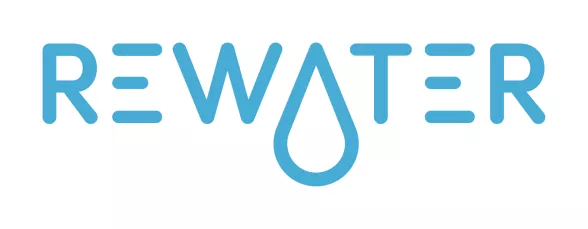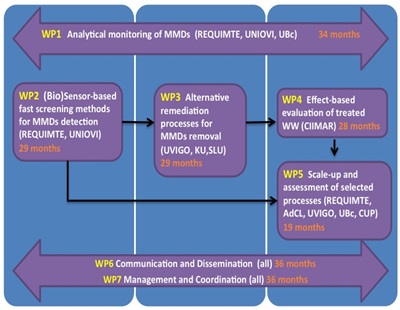REWATER
Sustainable and safe water management in agriculture: increasing the efficiency of water reuse for crop growth while protecting ecosystems, services and citizens’ welfare

Partners
Partners
UNIOVI - Universidad de Oviedo
University of Vigo
CIIMAR - Interdisciplinary Centre of Marine and Environmental Research
AdCL - Águas do Centro Litoral, S.A.
”Vasile Alecsandri” University of Bacau
Abstract
Abstract
Water is a natural resource vital for social wellbeing and agriculture economy. However, during the past decades, geographic and climate features, as well as active release of man-made chemicals, have led to water depletion and the loss of its quality. This creates a major need to increase water reuse, for example in agriculture. Wastewater treatment plants (WWTP) are crucial sources for water reuse since they promote the removal of unwanted substances. However, one of the major challenges restricting wastewater (WW) reuse is the presence of emerging contaminants (ECs), as they are usually not properly managed by conventional treatment technologies. These technologies still need urgent innovative development and integrated solutions to promote sustainable water reuse and safety.
The main objectives of REWATER project were:
- The development of research on and application of technologies producing a final integrated solution for WW reuse for agricultural purposes, including economic and environmental evaluation.
- The minimization of potential negative impacts of WW reuse on the environment, bearing in mind aquatic systems and agricultural products.
For this purpose, some model compounds were selected: Micropollutants and their Metabolites and/or Degradation (MMDs) products, belonging to two groups: pesticides and pharmaceuticals. These compounds were chosen because WWTPs have low removal efficiencies for some of them and they are omnipresent. REWATER provides a unique interdisciplinary expertise based on the consortium of scientific partners and SMEs specialized in WW treatment. The work programme included the tuned improvement and/or development of: 1) biosensors for the rapid and selective in-field determination of MMDs, 2) treatment processes for MMDs removal through physical, chemical and biological technologies and their combination, 3) ecotoxicological tools to evaluate treated water for reuse and expeditious surveillance, and 4) analytical monitoring, scaling-up and environmental/economic assessment of treatment processes. REWATER provided tools and solutions contributing to WW reuse, environmental health, and economic and social welfare. Interaction among the consortium’s partners, allied to stakeholders of the water industry, enhanced collaborative research and innovation as well as international cooperation in the water sector, during and beyond the REWATER‘s lifespan.
The REWATER project included 9 partners: • 3 from Portugal: REQUIMTE/LAQV (research unit), CIIMAR (research unit) and Águas do Centro Litoral (WWTP); • 2 from Spain: University of Vigo and University of Oviedo (both research units); • 2 from Romania: University of Bacau (research unit) and Focsani (WWTP); • 2 from Sweden: Kristianstad University and the Swedish University of Agricultural Sciences (both research units).
Project structure:
Project structure:

Implementation:
Implementation:
WP1 - Analytical monitoring of MMDs
WP2 - Development of (bio)sensor-based fast screening methods for in-field detection of MMDs
WP3 - Alternative remediation processes for MMDs removal
WP4 - Effect-based evaluation of treated WW
WP5 - Scale-up and environmental/economic assessment of selected remediation processes
WP6 - Communication and dissemination
WP7 - Management and coordination
Outcome/deliverables:
Outcome/deliverables:
The project will promote internationalization, facilitated by the increase in student mobility around Europe, and this parameter is an important indicator in the evaluation of researchers and institutions. Another contribution will regard the participation in international Conferences with joint presentations and publications. An effort on exploiting research results, outcomes and disseminating knowledge, not only to science and economy, but also to society in general, will have long lasting impact, especially to the priority theme “Developing Safe Water Systems for the Citizens”, as described in the Strategic Research and Innovation Agenda of the Water JPI. Additionally, other potential impacts will also be achieved, focusing on the technology transfer and exploitation of R&D results of REWATER activities. All efforts will be dedicated to the establishment of new cooperation synergies and agreements in key questions, leading to the future possibility of creating new commercial (bio)sensors and WW treatments. SME partners intend to implement the treatment processes developed in their own WWTPs, as a final step in their technology upgrading process.